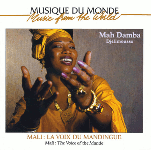マリ

"Djelimousso"
Mah Damba
avec Mamaye Kouyaté
et son ensemble
マー・ダンバ マンディングの歌声
|
CD-M-19
¥2,420 (税込) NEW !!> |
|
Mali マリ  |
"Djelimousso"Mah Damba
|
|
CD-M-19
¥2,420 (税込) NEW !!> |
| 西アフリカ マリの音楽CD WEST AFRICA MALI MUSIC CD |
 DVD/CD/BOOK |
ジャンベ ジャンベ関連商品一覧 |
 ジャンベ・民族楽器屋JUNJUN トップページ |